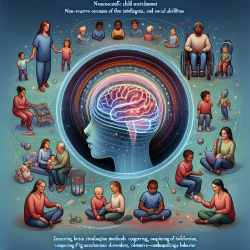Introduction
As a speech-language pathologist, understanding the broader context of health systems, especially in conflict-affected settings, can significantly enhance our practice. The recent scoping review titled "Human Resources for Health in Conflict Affected Settings: A Scoping Review of Primary Peer Reviewed Publications 2016–2022" provides valuable insights into the challenges faced by healthcare workers (HCWs) in these environments. This blog aims to highlight key findings from the review and suggest ways practitioners can apply these insights to improve their skills and outcomes.
Key Findings from the Review
The review highlights several challenges that HCWs face in conflict-affected settings (CAS), including:
- Education Sector Disruptions: Conflicts often disrupt the education and training pathways for HCWs, affecting the quality and quantity of trained professionals.
- Labour Market Dynamics: There is a significant imbalance between the inflow and outflow of HCWs, often leading to a shortage of skilled workers.
- Contextual Challenges: Security issues, economic pressures, and societal dynamics further complicate the working conditions for HCWs.
- Governance and Policy Gaps: Fragmented leadership and inadequate policy implementation exacerbate the challenges in managing the health workforce effectively.
Implications for Practitioners
For speech-language pathologists and other practitioners, these findings underscore the importance of considering the broader health system context when delivering services. Here are some practical steps to enhance your practice:
- Adaptability: Develop skills to adapt to rapidly changing environments and be prepared to take on roles that may not be typical in more stable settings.
- Collaboration: Work closely with local and international partners to ensure a coordinated approach to service delivery.
- Advocacy: Advocate for policies that support the health workforce, focusing on sustainable solutions that address both immediate and long-term needs.
- Continued Education: Seek opportunities for ongoing professional development, especially in areas like trauma-informed care and telepractice, which are increasingly relevant in CAS.
Encouraging Further Research
The review also highlights the need for more comprehensive research on HRH in CAS. Practitioners can contribute by participating in studies, sharing their experiences, and advocating for research funding. Understanding the unique challenges in these settings can lead to more effective interventions and improved health outcomes.
Conclusion
By integrating the insights from this scoping review into practice, speech-language pathologists can better support children and families in conflict-affected settings. Embracing adaptability, collaboration, and advocacy will enhance our ability to provide effective care. For those interested in delving deeper into the research, the original paper offers a comprehensive overview of the challenges and potential solutions for HRH in CAS.
To read the original research paper, please follow this link: Human Resources for Health in Conflict Affected Settings: A Scoping Review of Primary Peer Reviewed Publications 2016–2022.










